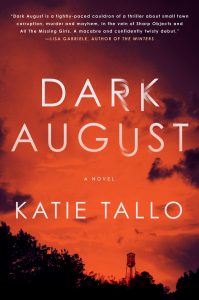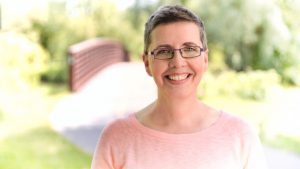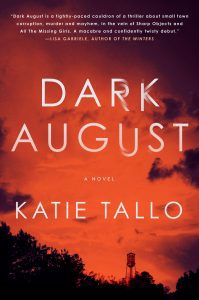Featured Author: Katie Tallo
 Katie Tallo describes her debut novel Dark August as, “A girl, a dog, a Buick and a cold case.” Augusta “Gus” is a young woman running from a hard life. She returns to her childhood home after her great-grandmother's passing. Gus finds herself unable to resist the mystery of her mother’s disappearance. She follows the trail of clues her mother left behind, uncovering secrets someone has worked very hard to hide. Tallo’s experience as a screenwriter shines through in this cinematic thriller. She has a gift for setting the scene and includes lots of visual details so readers can really see the story, the same way Tallo sees it as she’s writing. “When I’m novel writing, a movie is playing out in my head,” Tallo said. “I’m seeing the scenes, the wardrobe, the lighting and the camera angles.”
Katie Tallo describes her debut novel Dark August as, “A girl, a dog, a Buick and a cold case.” Augusta “Gus” is a young woman running from a hard life. She returns to her childhood home after her great-grandmother's passing. Gus finds herself unable to resist the mystery of her mother’s disappearance. She follows the trail of clues her mother left behind, uncovering secrets someone has worked very hard to hide. Tallo’s experience as a screenwriter shines through in this cinematic thriller. She has a gift for setting the scene and includes lots of visual details so readers can really see the story, the same way Tallo sees it as she’s writing. “When I’m novel writing, a movie is playing out in my head,” Tallo said. “I’m seeing the scenes, the wardrobe, the lighting and the camera angles.” Moving from Screenwriting to Writing a Novel
Tallo worked as a screenwriter and director for two decades before turning her hand to fiction. She procrastinated writing a novel for years. After reading On Writing by Stephen King, she decided to take the plunge. “ suggestion was to simply stick some characters in a situation and then let them tell the story. So I did that,” Tallo said. “It was fun to have no clear plan, just letting go and writing. That novel went on to win an international novel contest and landed me a NYC agent, which ultimately led me to write Dark August and get published.” Tallo wanted to write her novel for her daughter, who loves suspense fiction. Plus, suspense is a good fit with her personality. “I love a good mystery and I have a bit of a dark side, so it just seemed the most me thing I could do,” Tallo said.Virtual Author Visit
Hear Tallo talk about her work Thu, Dec 3, 7pm via Zoom. Bring your questions on books, writing, screenwriting, etc. Register for the Zoom link.
Read on to hear about Tallo’s reading life, including the books that changed her perspective and influenced her writing. Full Interview with Katie Tallo
Full Interview with Katie Tallo
Are there skills you developed as a screenwriter that helped you as you wrote your novel?
I think I’m still a screenwriter at heart. When I’m novel writing, a movie is playing out in my head. I’m seeing the scenes, the wardrobe, the lighting and the camera angles. I love great dialogue and I can often be heard saying the words out loud and waving my arms about as I act out scenes. My husband used to think there was something seriously wrong with me. Now he knows I’ve just wandered off into my novel world and I’m talking to my imaginary friends.Are there any books that influenced you as a writer?
What kickstarted my desire to finally write my first novel was Stephen King’s On Writing. Style-wise and storytelling-wise, there are novels and writers that definitely inspire my writing like The Road by Cormac McCarthy, The Dog Stars by Peter Heller, The Holding by Merilyn Simonds and The Heavenly Table by Donald Ray Pollock, plus almost everything by James Lee Burke and Margaret Atwood.Books that made you cry?
I’m not a cryer. But a book that I find achingly beautiful is The Stone Diaries by Carol Shields. Her prose are so poignant, I often found I had to read and re-read sections of that book, so as to fully absorb their power. I also love the poetry of Adrienne Rich and if I did shed a tear, it was likely when I read her poem, Phantasia For Elvira Shatayev.Books that made you laugh?
I don’t tend to read comedic works, but I do love touches of dark humor in mystery stories. Black comedy. Dry comedy. That’s my thing. In terms of some good old belly laughs, I did laugh out loud reading the short stories in Brian Doyle’s collection The Low Life.Have you ever read a book that changed your perspective?
I think my life shifted ever so slightly when I read Margaret Atwood’s The Edible Woman. I was in my early twenties. I connected so viscerally with the woman in the story, with her disconnectedness and her choice to do something strange and rebellious — something different than follow the path laid out for her by society. I felt like I understood the voice of the character, and the writer. She was speaking to me. She was exploring ideas I hadn’t yet begun to even consider about my own life. It was eye-opening that a story could be about a seemingly ordinary life, yet feel so extraordinary.Do you ever re-read books? Are there any books that you think of as "comfort food?”
Mystery series like the Cormoran Strike series by Robert Galbraith or the Fiona Griffiths crime series by Harry Bingham, are my go-to comfort reads. I love revisiting the familiar characters, seeing how they’ve grown, watching them use their skills to solve a new mystery, and of course, seeing if I can figure it out before them.Have libraries played a role in your reading life?
My mum used to bring my sister and I to the library once every two weeks or so to choose a book. I think I loved the choosing almost more than the reading. I loved the feel of the books, the endless titles and covers lined up along the shelves. And being a competitive child I also wanted to find a better book than my sister so I remember feeling like a library outing was a bit like a treasure hunt. I’d often choose a book for it’s cover, then discover so much more inside when I got home.You worked for two decades as a screenwriter and director. What prompted you to tackle fiction writing? Why suspense?
I had wanted to write a novel for a long time, but didn’t know how to get started and I couldn’t land on the “perfect” idea for a novel so I procrastinated for years. Decades really. Then I read Stephen KIng’s On Writing and his advice launched the writing of my first novel. His suggestion was to simply stick some characters in a situation and then let them tell the story. So I did that. It was fun to have no clear plan, just letting go and writing. That novel went on to win an international novel contest and landed me a NYC agent, which ultimately led me to write Dark August and get published. I decided to make Dark August a suspense novel because I was writing it for my daughter and that’s her favorite genre. Also, I love a good mystery and I have a bit of a dark side, so it just seemed the most me thing I could do.Are there skills you developed as a screenwriter that helped you as you wrote your novel?
I think I’m still a screenwriter at heart. When I’m novel writing, a movie is playing out in my head. I’m seeing the scenes, the wardrobe, the lighting and the camera angles. I love great dialogue and I can often be heard saying the words out loud and waving my arms about as I act out scenes. My husband used to think there was something seriously wrong with me. Now he knows I’ve just wandered off into my novel world and I’m talking to my imaginary friends.Is Dark August purely a work of fiction, or did it require research?
It’s purely fiction, but I do like to dapple make belief with little bits of real life, like historical names and actual places. I did a little research into aspects of geology, banking, fracking and the RCMP, but for the most part, it is all made up. Although it’s worth mentioning that Levi, the dog in the story, is based on my real life dog who sat at my feet while I wrote the novel. His personality is truly captured in the novel. Sadly, he’s no longer with me, but I’m loving that he is forever immortalized in the novel.*Katie Tallo was interviewed by Miranda Ericsson via email in October 2020.
Tallo's Background
Tallo was born in Toronto, Ontario, and grew up in the suburbs of Ottawa. She studied TV Broadcasting at Algonquin College and filmmaking at the prestigious Summer Institute of Film and Television and Women in the Director’s Chair. In the two decades that followed, Tallo had an award-winning career as a screenwriter and director. She collaborated on projects in animation, television and motion pictures. Tallo received support from the Ontario Arts Council and Canada Council for the Arts. Her films have been screened at the San Francisco International Film Festival, Sudbury Cinefest, Local Heroes International Film Festival and the NSI Film Exchange.
As a freelance writer, Katie has contributed articles to Problogger, Zen Habits, Live Bold & Bloom, Write To Done, Be More With Less, Tiny Buddha and Rowdy Kittens. In 2013 her manuscript 22 Mondays (aka Gone Monday) won top prize in the international Mslexia Women’s Novel Writing Competition. During the next four years, with her golden retriever (Levi) by her side, Tallo began writing the thriller Dark August (Harper Perennial, June 30 2020). The novel is set in the Wellington West neighborhood where Tallo lives with her husband, Andy. She is currently working on a sequel. Her beloved Levi lives on in the novel. Visit the author's page to learn more.










